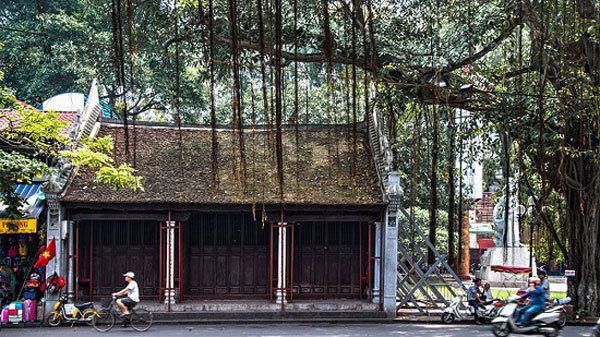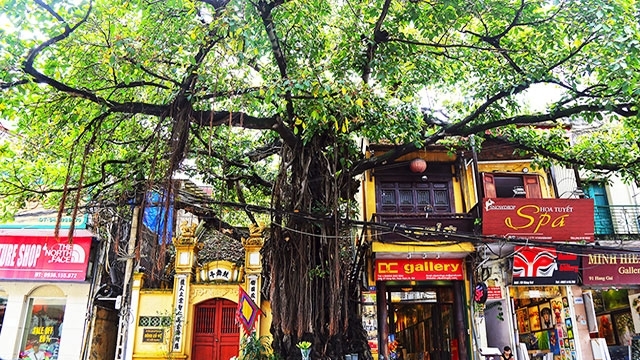Based on the surviving ancient documents and epitaph from the Later Le Restoration dynasty, the temple belonged to Ta Vong Village, Tho Xuong District, then in the mid-nineteenth century, its jurisdiction was changed to Ha Thanh Village, Dong Cac Ward, Tho Xuong District, Hanoi province. The current location of the temple is in Dinh Tien Hoang Street, Ly Thai To Ward, Hoan Kiem District, Hanoi City.
The temple is dedicated to Mother Goddess Lieu Hanh and her two maidens named Quynh Hoa and Que Hoa princesses. Mother Goddess Lieu Hanh is one of the Four Immortals along with Tan Vien (the God of the Mountain), Saint Giong and Saint Chu Dong Tu in the pantheon of genii worshiped by the Vietnamese people.
 |
| An ancient banyan tree next to Ba Kieu Temple. |
The temple was built in the Later Le Restoration and expanded in the mid Canh Tri reign in the 17th century. Being made of precious materials including wood from Xua jungle and rock from Nhue mountain from Chau Ai region in central Vietnam, through the hands of skillful craftsmen, Ba Kieu Temple became really a rare architectural masterpiece. The temple was built in the shape of the 工 (gong) of Chinese characters, which comprises Dai Bai (Chamber of Ceremonies), Phuong Dinh (Fang Pavilion) and the Hau Cung (Back Chamber).
Suffering the ups and downs of history, Ba Kieu Temple was damaged and has been restored many times, but still it retains the ancient features.
The special value of Ba Kieu Temple is created by the relics of the Le Tay Son, Nguyen dynasties it preserved until today. First and most precious among them is a large bronze bell (94cm in height, 45cm in mouth diameter) cast in the 8th year of the Canh Thinh reign (1800). The bell was offered by the marquis of Nhuan Trach Tran Duy Ung, a dignitary under the Tay Son Dynasty. There are also four stone shafts considered to be the important historical records:
- Hung Cong Bi (the stele of Hung Cong) erected in the 8th year of the Canh Thinh reign (1800) recording the donation of Tran Duy Ung – a mandarin under the Tay Son reign;
- Trung Tu Huyen Chan Tu Bi Ky recording the restoration of Huyen Chan temple which was built in the 19th year of the Tu Duc reign (1866);
- Thien Tien dien nguyen phung quan nhan the thu huong hoa Le toc to tien tong huong bi (the stele of second ancestral lineage of the Le family voluntarily receiving the hereditary care of Thien Tien pavilion and allowed by the villagers) established in the year of the Tu Duc reign (1874) records the 5 generations of the Le clan from the forefather Trong Le to the fifth Trong Tin;
- Le toc bi ky (The stele of the Le clan) found in the 8th year of Bao Dai reign (1933) records the Le Chat Ky and Le Van An both enjoyed the worship of the local people.
Still preserved in Ba Kieu Temple are the 27 papers conferring titles on Mother Goddess Lieu Hanh and her two fairy maidens Quynh Hoa and Que Hoa. The papers are the precious and rare artifacts, especially for the Mother Goddess worshipping. Among the 27 conferring papers, three issued in 1783 or the 44th year of Canh Hung reign and other three in 1787 under the Le dynasty, three by Quang Trung under the Tay Son dynasty (1792), and other three under the reign of Canh Thinh (1793). Over the reigns of Kings Minh Menh, Thieu Tri, Tu Duc, Đong Khanh, and Duy Tan of the Nguyen dynasty, the Mother Goddess was conferred fine names and ranked among Supreme Mother Goddess.
With outstanding values, Ba Kieu Temple together with the relic complex of Ngoc Son Temple and Hoan Kiem Lake area have been the pride not only of Hanoians but also of all Vietnamese forever. Hanoitimes
Thanh Dat

Banyan trees beat Hanoi’s summer heat
Hanoi is not only known for its old streets but also century-old banyan trees, which have stood against time and witnessed many historical ups and downs.

Hanoi plans various activities in pedestrian area around Hoan Kiem Lake
Hanoi City’s Department of Culture and Sports has planned a wide range of cultural and arts activities to be held along the pedestrian streets in the vicinity of Hoan Kiem Lake after the area reopened for visitors.